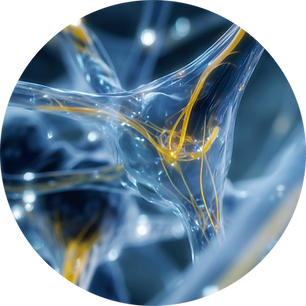

Neurological diseases such as Parkinson's disease and depression affect the world. Traditional treatments have side effects and limitations and cannot repair nerve damage. Rb+ reNerve supplements provide a new solution for Parkinson's disease and depression by promoting BDNF production and repairing ion channels.
Background and Overview of Neurological Diseases
Disease Overview
Parkinson’s disease and depression are major challenges in the nervous system. These conditions involve neuronal damage, neurochemical imbalances, or functional degeneration, affecting movement, cognition, mood, and daily living abilities.

Characteristics of Parkinson’s Disease
-
Caused by the degeneration of dopamine neurons in the substantia nigra region of the brain, leading to insufficient dopamine levels, which impacts brain function and motor control.
-
Includes resting tremor (involuntary shaking of hands or legs), muscle rigidity (limiting flexibility), bradykinesia (slowed movements hindering daily activities), cognitive impairment (memory decline, difficulty concentrating), and balance issues.
-
It is estimated that approximately 7 million people are affected by Parkinson’s disease, with a higher incidence in those over 50 years old, and slightly higher in men than in women.


Characteristics of Depression
-
Involves imbalances in brain neurotransmitters, particularly serotonin (5-HT), dopamine, and norepinephrine, associated with genetics, environmental stress, and neuroinflammation.
-
Includes persistent low mood, loss of interest or pleasure, fatigue; changes in appetite or weight; feelings of guilt or hopelessness. Cognitive impairments, sleep problems; anxiety or agitation, and in severe cases, suicidal ideation.
-
Globally, about 300 million people are affected, impacting all age groups, with a slightly higher incidence in women than in men, especially following stressful events or hormonal changes.
Limitations of Traditional Treatments

Parkinson’s Disease
-
Medications (such as levodopa): Provide short-term symptom relief, but long-term use may lead to side effects like dyskinesia.
-
Surgery (such as deep brain stimulation): Limited applicability, with risks including infection or cerebral haemorrhage.
-
Current Shortcomings: Cannot repair neuronal damage or rebuild signal pathways, leading to a decline in patients’ quality of life over time.
Depression
-
Medications (such as SSRIs): Alleviate mood symptoms, but may cause side effects like drowsiness or sexual dysfunction.
-
Psychotherapy: Effectiveness varies by individual and requires long-term commitment.
-
Current Shortcomings: Cannot directly repair neurotransmitter imbalances, with symptoms persisting in some patients.

Protecting Promoting
Balancing Rebuilding
-
The World’s Exclusive Edible Rubidium Supplement
-
Rubidium: A Rare Metal More Precious Than Gold, Creating Unparalleled Health
-
Rubidium helps with Parkinson’s disease, depression, and neurological diseases


-
Exclusive Advantages: Utilising the trace element properties of rubidium ions (Rubidium+), combined with 27 essential trace elements for the human body, to provide support for neural pathways and signal transmission.
-
Assists traditional treatments, promoting neuronal repair and functional recovery.
-
Scientific Basis: Rubidium ions (Rubidium+) can promote the secretion of BDNF (brain-derived neurotrophic factor), improving mood, cognitive function, and nervous system health by regulating ion channels and neural signals.


Protecting Neurons
-
Stabilising neuronal function.
-
Reducing damage, protecting dopamine neurons in Parkinson’s disease to improve motor abilities; protecting neurons from stress-related damage to stabilise mood regulation.
Promoting Neural Repair
-
Rubidium ions help elevate BDNF, a protein that supports neural growth.
-
Repairing damaged neurons, improving cognition, mood, bradykinesia, and rigidity, enhancing quality of life.


Balancing Neural Signals
-
Rubidium ions regulate excitatory and inhibitory signals.
-
Reducing tremors and rigidity, improving sleep, alleviating anxiety and mood fluctuations.
Rebuilding Neural Pathways
-
Rubidium ions repair ion channels, opening new signal pathways.
-
Supporting neural function, delaying the progression of Parkinson’s disease.


Pharmacology
Neuroprotective Effects and Ion Channel Activation
-
Chemical Basis: Rubidium (Rb) is an alkali metal with chemical and biological properties similar to potassium (K) and sodium (Na), capable of partially substituting potassium ions to enter cells and regulate cellular function.
-
Mechanism: By regulating the potential stability of neuronal cell membranes, it stimulates sodium (Na+), potassium (K+), and calcium (Ca2+) ion channels, promoting ion flow and enhancing neural signal transmission.
-
Effects: Reduces oxidative stress and toxic damage to dopamine neurons, enhances neuronal potential activity in Parkinson’s patients, improving dopamine system function. Alleviates neuroinflammatory damage to mood-related neurons, stabilising serotonin and mood regulation.
-
Benefits: Protects dopamine neurons in the substantia nigra, slows degeneration, alleviates low mood, improves response to external stimuli, prolongs maintenance of motor function, and enhances coordination.
Regulating Neural Metabolism and Signal Transmission Balance
-
Neurotransmitter Influence: Rb regulates the balance between excitatory (glutamate) and inhibitory (GABA) neurotransmitters.
-
Process: By stabilising the excitatory and inhibitory states of the nervous system, it reduces overactive neural signals and maintains transmission stability.
-
Symptom Improvement: Alleviates motor symptoms like tremors and muscle rigidity in Parkinson’s disease, while reducing anxiety, mood fluctuations, improving sleep quality and emotional stability.
-
Benefits: Supports normal brain signal processing, promotes mood regulation, enhances daily activity capabilities, and strengthens overall nervous system health.
Rebuilding Ion Channel Circuits and Forming New Signal Pathways
-
Mechanism: Repairs disease-damaged potassium, sodium, and calcium ion channels, restoring normal flow; simultaneously stimulates neuronal regeneration or synaptic remodelling, creating alternative pathways.
-
Effects: Rebuilds substantia nigra dopamine pathways, promotes neuronal functional recovery, compensates for lost original signal transmission routes, and enhances brain adaptability.
-
Benefits: Long-term improvement in mood stability, delays Parkinson’s disease progression, long-term enhancement of cognitive and motor functions, particularly for patients with nervous system diseases.
Enhancing Brain-Derived Neurotrophic Factor (BDNF)
-
BDNF Introduction: Brain-derived neurotrophic factor (BDNF) is a key protein that promotes neuronal growth, repair, and synaptic plasticity, supporting brain learning and adaptability.
-
Rubidium’s Role: Animal studies show that trace Rb may increase BDNF production by regulating gene expression, enhancing neural repair.
-
Clinical: Elevating BDNF levels improves inter-neuronal connections, enhances motor control, improves mood stability and cognition, reduces bradykinesia and rigidity in Parkinson’s disease.
-
Benefits: Long-term support for neural repair, improving mood, cognition, and motor functions, enhancing patients’ quality of life.
Some cases
Parkinson’s Disease
Parkinson’s Disease
This product is not suitable for pregnant women, breastfeeding women and children





